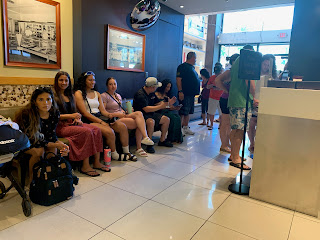 |
| Gerald Groff (WSJ photo) |
Given the controversies surrounding recent Supreme Court decisions on free speech, affirmative action, and student-loan forgiveness, it's easy to overlook their
unanimous statement on a religious accommodations case.
The 9-0 decision in
Groff v. DeJoy is likely to affect thousands of workers and their employers. The
facts:
[Gerald] Groff began working at the U.S. Postal Service in 2012, delivering mail in rural parts of Lancaster County, Pa. In 2013, the Postal Service contracted with Amazon.com to deliver Amazon packages, including on Sundays.
Groff eventually transferred to a small Postal Service facility in Holtwood, Pa., to avoid Sunday work. But in March 2017, the Holtwood facility also began Amazon Sunday delivery service.
His supervisor attempted to find other carriers to cover his Sunday shifts, saying that such shift swaps were the only accommodations that wouldn’t affect operations.
Groff never agreed to work on a Sunday. He received warnings, suspensions and other sorts of discipline short of termination for declining Sunday shifts assigned to him. The Postal Service said that these disciplinary actions were corrective rather than punitive, and that his pay was never docked.
In 2019, Groff resigned, saying he had no choice but to quit, and sued the Postal Service for failing to reasonably accommodate his religious practice.
The lower courts referred to the statute and a 1977 case,
Trans World Airlines v. Hardison, to reject the lawsuit. They said that his employer, the USPS, didn't have to reschedule Mr. Groff because it would incur more than a
de minimis cost.
The Supreme Court said that interpretation of
Hardison was wrong, that "undue hardship" for the employer means that the USPS had "substantial increased costs", not just something above the minimum. To be clear, the Court did not say Mr. Groff was correct but told the lower courts to apply the substantial-burden criterion to his case.
While applauding Gerald Groff for standing up for his beliefs, I also sympathize with the employer, who in the end may well end up proving that it experienced substantial increased costs ("Groff was hired as a part-time, flexible carrier at a four-person post office, and he refused to show up for 24 Sundays of work.”)
I can also see many employers being bombarded with claims that employees can't work Sundays or other Holy Days because of their religion. Not all of these claims will be from true believers, and companies may well conclude that it is better to give in than risk a bigger loss in court.










































.jpeg)